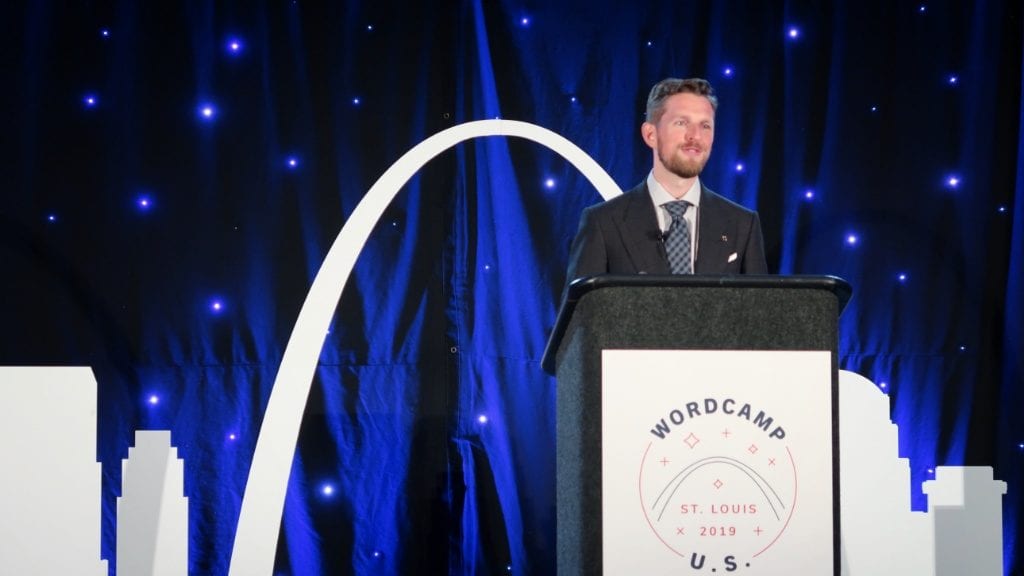On Saturday night, Matt Mullenweg took the stage in St. Louis to deliver the 2019 State of the Word. The talk provides a look at this year in the WordPress community and what is on the horizon for the platform.
Mullenweg opened this year’s talk by premiering a documentary created about the WordPress community by WordFence, Open. It’s a look at the beauty and power of the people that run the CMS. It set the tone for the rest of the State of the Word.
This year’s WordCamp included 47 organizers, 122 volunteers, and 90 speakers. A huge amount of work done by very few people.

WordPress in 2019
Mullenweg went through this year in WordCamp. He mentioned the new Site Health feature included with 5.1, which tells users if their website is up to date, and essentially, healthy. With 5.2, came the new widget screen, and allowed the user to hide or show certain blocks with this update.
Probably the most exciting feature was the elimination of the White Screen of Death. Users now get notified before a plugin causes a critical issue.
This year, the minimum PHP version was raised to 5.6.20. 83 percent of sites running on WordPress 5.2 are running on PHP 7 or later.
One of the most impressive stats is how many WordPress events were held including 141 WordCamps including 34 new cities, 17 KidsCamps, 5,000+ meetups, and 16 do_action charity hackathons.
Mullenweg spoke about the passing of Alex Mills, and announced a scholarship financed by Automattic in his name that will give a plugin developer a full ride to a WordCamp.
Reminiscing on a year ago, Mullenweg shared negative reviews of Gutenberg right after it had been merged with Core in December of 2018.
“We learned a lot about the process and also how we can create changes in the future,” Mullenweg said. “I understand why we got a lot of this feedback but we did get through it together.”
Since that release, there have been 20 new releases since 5.0 The number of Gutenberg contributors has grown from 200 to 480.
A huge milestone was reached this year with 1,122 people contributing to WordPress, which is the most ever in the history of the CMS.
WordPress in 2020
Mullenweg then moved onto talk about the year ahead.
Later this month, 5.3 will be live as well as the new 2020 theme. This update will come with an admin email verification, so no one won’t be able to log into their site.
There are big things ahead for Gutenberg. One of the top things being social icons. You can now add icons anywhere you can put a Gutenberg block.
A new navigation editor makes it easier to find what you’re looking for including a color picker and the ability to add gradients. There is a multi-button block that makes it easy to add as many buttons as you need.
“People are creating blocks left and right, and it’s very exciting to see what’s going on,” Mullenweg said.
The new Block Directory will pull in a block instantly with now page loads or anything. You can use those blocks in line as what you’re doing. This will also include block patterns, or collections of blocks.
“What we’re really trying to enable is you can look at any website in the world and build that inside WordPress with just a few clicks, ”
Matt Mullenweg
As of now, Mullenweg estimates Gutenberg is 20 percent done. There is much more that can be done.
Last year, Mullenweg announced there are going to be four phases of Gutenberg. The first phase tackled all the usability issues in TinyMCE and other editors.
Right now, the team is in the middle of the second phase, or customization phase. The next two phases are Collaboration, allowing people to co-edit right in the editor, and Multilingual.
Be the Change
To end the talk, Mullenweg went over ways anyone can get involved in the WordPress community.
The first of which is “Be the Change.” This is best exemplified by Contributor Day. A great way to sit down and actually build something for WordPress with other developers.
Another way is to check out a plugin called Design Experiments. This is a way to try out things before they are shipped into an update and provide feedback.
The next call was for “More Blocks.” If you find yourself needing something Gutenberg doesn’t support, build a block and share that with the community. As the blocks increase, there will be more and more ways to use the editor and create beautiful websites.
Like to work with people? Think about helping “Teach the Change.” Mullenweg encouraged people to reach out to others and show them how to level-up their WordPress skills.
Another great way to spread the word of WordPress is with meetups. There are meetups all over the world, where community members can get together and learn and share about the platform.
Want to travel for WordPress? 2020 will have the first-ever WordCamp Asia in Thailand in February, and WordCamp Europe will be in Portugal in June.
“The software is pretty good, but the people are amazing,”
Matt Mullenweg
At the end of the day, the entire reason for WordPress is to help grow the Open Web. WordCamp US is a real showing of the power of the CMS. People from all over the country, and often all over the world, get together to talk about WordPress and the open web. The people working on WordPress are the ones that will eventually conquer the remaining 70 percent of the web.

1 Comment
Join the conversation